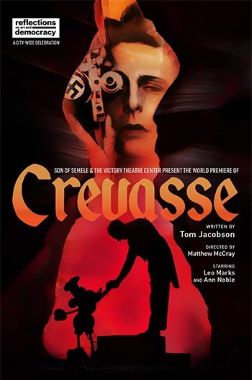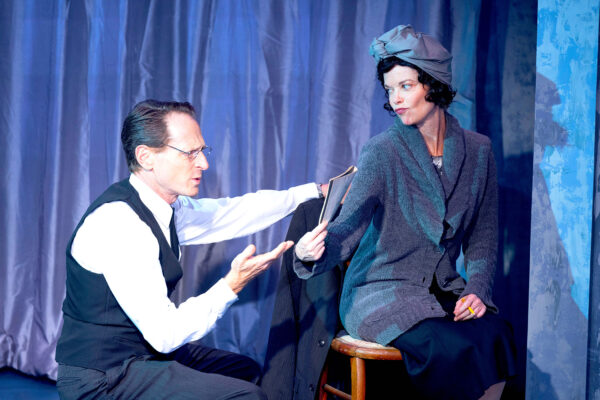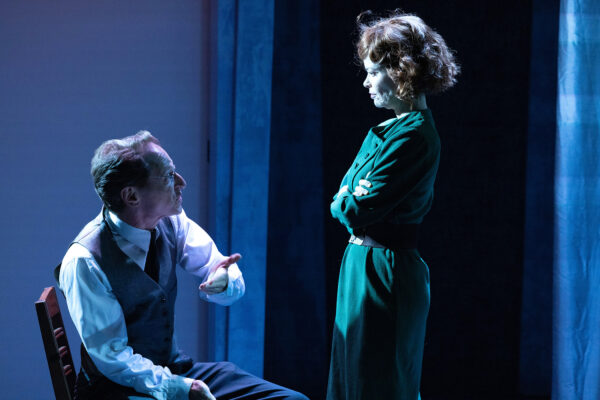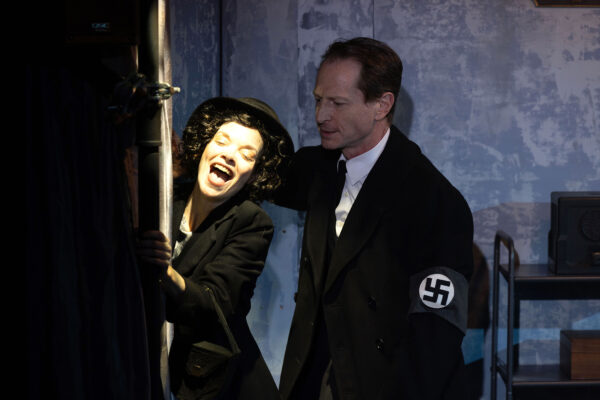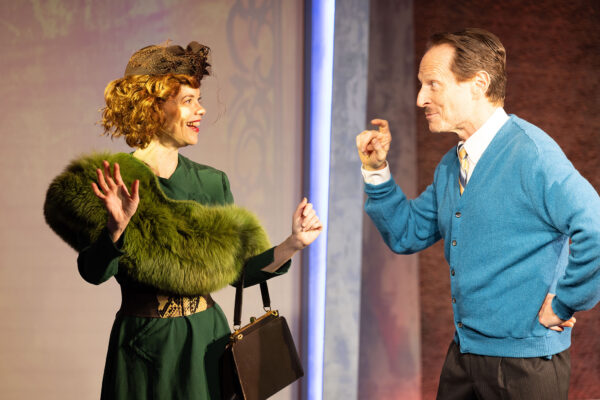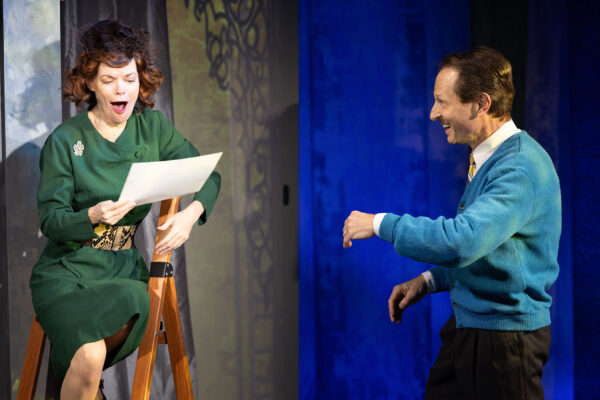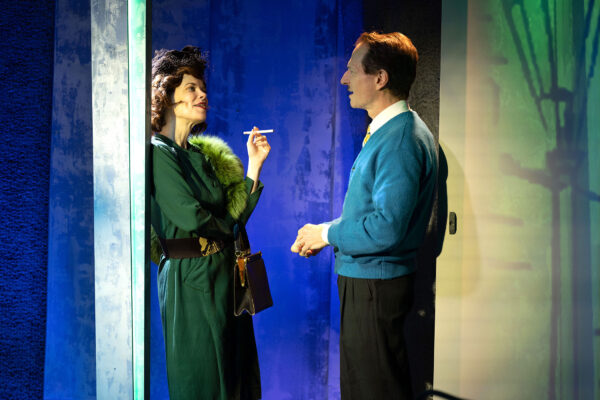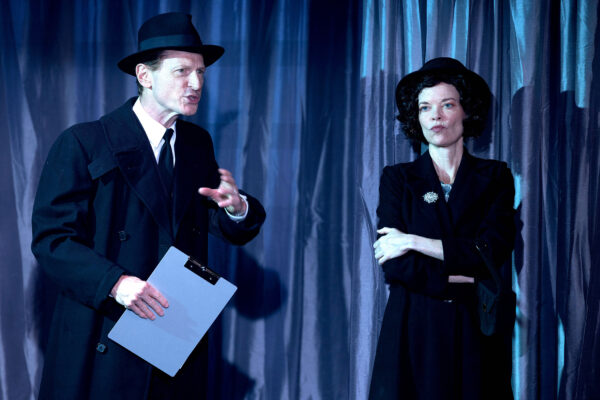A RIVETING TALE OF ART AND IDEOLOGY AT ITS FINEST
In Tom Jacobson’s Crevasse, playing at the Victory Center Theatre, the curtain rises on a fractured world where art, love, and propaganda intersect amidst the gathering storm clouds of World War II. This ambitious play, set in the fall of 1938, deftly traverses the fraught terrain between Berlin and Hollywood, exploring the multifaceted lives of its characters with a narrative that is as compelling as it is complex.
The play begins in an almost stark simplicity. Ernst Jaeger, a film critic and publicist played with palpable depth by Leo Marks, is isolated in a pool of light, delivering an opening monologue that immediately sets the tone for the moral ambiguities and personal dilemmas that follow. Ernst is joined by his wife, Lotte Jaeger (a magnetic Ann Noble), a fashion designer whose transformation throughout the play reveals both the strength and vulnerability of a woman determined to navigate the perilous waters of Nazi Germany.
Jacobson’s script oscillates between various locales — Ernst and Lotte’s home in Berlin, the deck of the Europa, Walt Disney Studios, among others — with a fluidity that underscores the global and psychological expanse of the story. The set design is minimalistic, relying primarily on lighting and furniture to delineate the shifting scenes. This choice not only keeps the focus on the actors but also mirrors the stark contrasts and overlapping realities of the narrative.
Ernst and Lotte’s dialogue is sharp and filled with a rich emotional undercurrent. As the couple grapples with the decision to divorce — an act Lotte believes necessary for their survival — we see the profound tension between personal desire and the brutal demands of the era. Lotte’s line, “I’m not leaving you — I’m divorcing you,” encapsulates the heart-wrenching pragmatism that drives much of the play’s emotional weight.
The narrative takes a particularly interesting turn with the introduction of historical figures portrayed by the main characters. Marks steps into the shoes of Dr. Joseph Goebbels and Walt Disney, while Noble transforms into Leni Riefenstahl and an FBI agent named Lorelei. These transitions, handled with deft precision by the actors, provide a multifaceted exploration of identity and the malleable nature of self under extreme circumstances.
Jacobson’s portrayal of these iconic figures is neither simplistic nor one-dimensional. Instead, he paints them in shades of gray, highlighting their complexities and contradictions. Goebbels, for instance, is depicted not merely as a propagandist but as a man whose personal and political ambitions are fraught with moral corruption. Similarly, Disney is shown as a creative genius whose idealism clashes with the harsh realities of the industry and the world around him.
One of the play’s standout sequences involves a tense and revealing encounter between Leni Riefenstahl and Joseph Goebbels. Their interaction, marked by a mix of flirtation, manipulation, and outright confrontation, offers a chilling glimpse into the power dynamics and personal vendettas that fueled much of the Nazi regime’s inner workings.
Equally compelling is the portrayal of Leni’s relationship with Walt Disney. The contrast between Riefenstahl’s ambitious pragmatism and Disney’s creative idealism serves as a powerful commentary on the role of art in society. Their discussions about film, propaganda, and the potential for collaboration are not only intellectually stimulating but also emotionally charged, revealing the deep personal stakes involved in their professional lives.
Evan Baroletti‘s set uses satiny curtains and sliding/revolving panels — characterized by a limited color palette of black, white, and gray with animated Disneyesque projections during Hollywood scenes by Nicholas Santiago — serves to heighten the dramatic tension and underscore the thematic contrasts. This visual starkness, combined with Jacobson’s intricate characterizations, creates a visceral experience that draws the audience into the emotional and ideological turmoil of the time.
Jacobson’s dialogue is another of the play’s great strengths. It is sharp, witty, and often laden with subtext, requiring the audience to engage actively with the unfolding drama. Lines such as Lotte’s declaration, “You’re both Protestant!” or Ernst’s lament, “I find it difficult to believe he jumped you unprovoked,” are loaded with historical and emotional significance, reflecting the layered complexity of the characters’ lives.
In its exploration of identity, propaganda, and the power of art, Crevasse offers a nuanced and timely examination of the moral complexities inherent in times of political and social upheaval. Jacobson does not shy away from the darker aspects of his characters’ lives, nor does he offer easy resolutions. Instead, he presents a world in which personal and political survival often demands difficult choices and profound sacrifices.
The performances in Crevasse are uniformly excellent, with the actors bringing a depth and nuance to their roles that are both engaging and thought-provoking. The chemistry between Ernst and Lotte is particularly noteworthy, capturing the intricate dance of love, conflict, and mutual dependence that defines their relationship.
Matthew McCray’s direction is impeccable, masterfully calibrating the pacing and ensuring seamless transitions between scenes. John Zalewski provides dramatic sound design. Amanda Zarr carefully chose historically correct props. Michael Mullen’s period-perfect costumes and wigs are to be commended.
Tom Jacobson’s Crevasse is a masterful blend of historical drama and personal narrative, offering a rich tapestry of character and theme that resonates long after the final curtain falls. It is a brilliant play that challenges, provokes, and ultimately, illuminates, and should hopefully make itself to New York and other cities. I will leave it to audiences to possibly draw parallels between the historical events depicted in the play and our current political climate.
photos by Matt Kamimura
Crevasse
Son of Semele and The Victory Theatre Center
Victory Theatre, 3326 W Victory Blvd. in Burbank
Fri and Sat at 8; Sun at 4
ends on August 18, 2024 — then remounts October 4 through October 27, 2024
for tickets ($25-$40), call 818.841.5421 or visit The Victory Theatre Center
